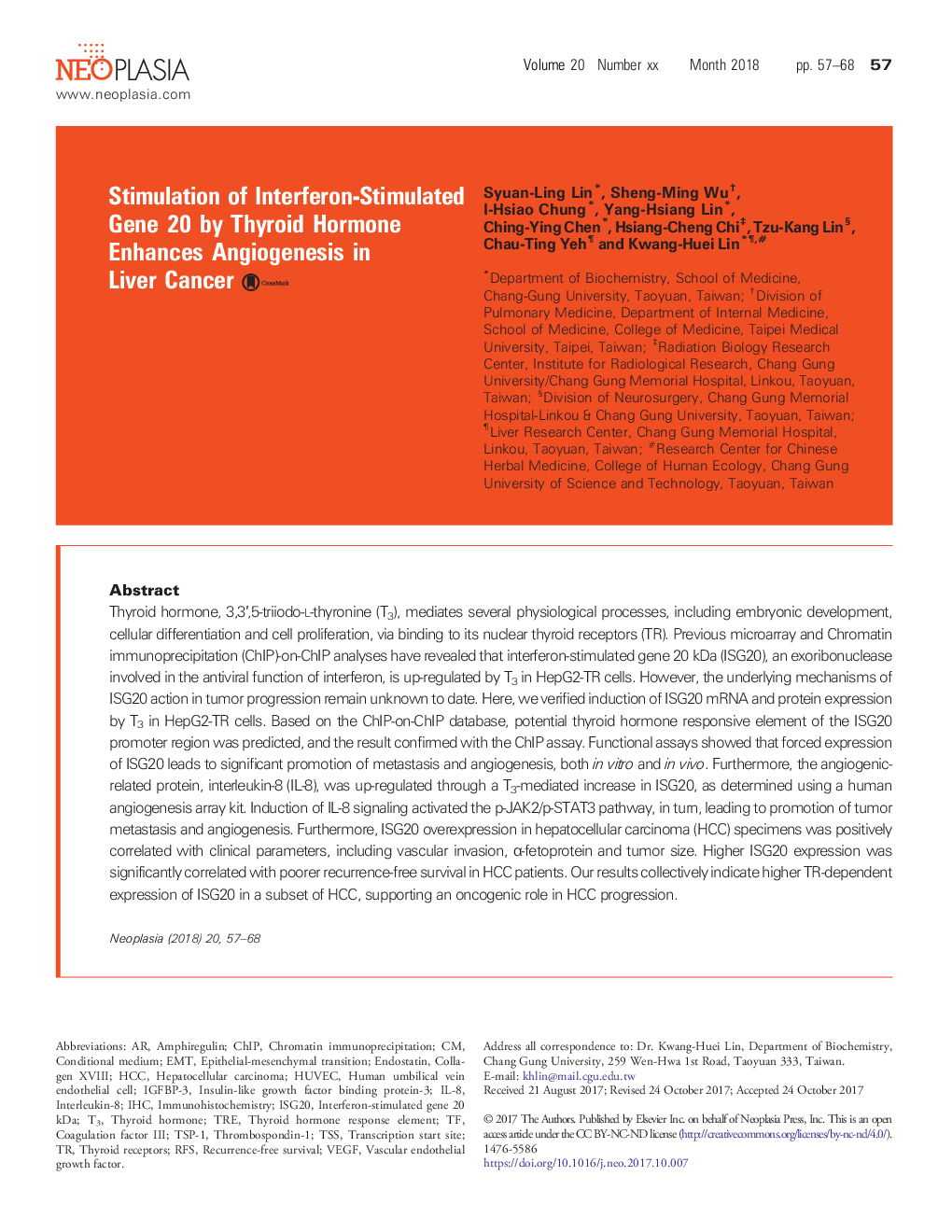| Article ID | Journal | Published Year | Pages | File Type |
|---|---|---|---|---|
| 8456857 | Neoplasia | 2018 | 12 Pages |
Abstract
Thyroid hormone, 3,3â²,5-triiodo-l-thyronine (T3), mediates several physiological processes, including embryonic development, cellular differentiation and cell proliferation, via binding to its nuclear thyroid receptors (TR). Previous microarray and Chromatin immunoprecipitation (ChIP)-on-ChIP analyses have revealed that interferon-stimulated gene 20 kDa (ISG20), an exoribonuclease involved in the antiviral function of interferon, is up-regulated by T3 in HepG2-TR cells. However, the underlying mechanisms of ISG20 action in tumor progression remain unknown to date. Here, we verified induction of ISG20 mRNA and protein expression by T3 in HepG2-TR cells. Based on the ChIP-on-ChIP database, potential thyroid hormone responsive element of the ISG20 promoter region was predicted, and the result confirmed with the ChIP assay. Functional assays showed that forced expression of ISG20 leads to significant promotion of metastasis and angiogenesis, both in vitro and in vivo. Furthermore, the angiogenic-related protein, interleukin-8 (IL-8), was up-regulated through a T3-mediated increase in ISG20, as determined using a human angiogenesis array kit. Induction of IL-8 signaling activated the p-JAK2/p-STAT3 pathway, in turn, leading to promotion of tumor metastasis and angiogenesis. Furthermore, ISG20 overexpression in hepatocellular carcinoma (HCC) specimens was positively correlated with clinical parameters, including vascular invasion, α-fetoprotein and tumor size. Higher ISG20 expression was significantly correlated with poorer recurrence-free survival in HCC patients. Our results collectively indicate higher TR-dependent expression of ISG20 in a subset of HCC, supporting an oncogenic role in HCC progression.
Keywords
ISG20Conditional mediumTSP-1IGFBP-3TSSRFSIL-8HUVECHCCamphiregulinEndostatinchromatin immunoprecipitationImmunohistochemistryIHCInterleukin-8Recurrence-free survivalThrombospondin-1EMTtranscription start siteHuman umbilical vein endothelial cellTREThyroid hormone response elementVascular endothelial growth factorVascular Endothelial Growth Factor (VEGF)Thyroid hormoneInsulin-like growth factor binding protein-3CHiPHepatocellular carcinomacollagen XVIIIEpithelial-mesenchymal transitionthyroid receptors
Related Topics
Life Sciences
Biochemistry, Genetics and Molecular Biology
Cancer Research
Authors
Syuan-Ling Lin, Sheng-Ming Wu, I-Hsiao Chung, Yang-Hsiang Lin, Ching-Ying Chen, Hsiang-Cheng Chi, Tzu-Kang Lin, Chau-Ting Yeh, Kwang-Huei Lin,
